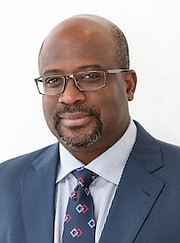• Assessing if long-term rise requiring premium hike
• Bahamas First chief pledges ‘no knee jerk’ reaction
• RoyalStar counterpart says costs have jumped 15%
By NEIL HARTNELL
Tribune Business Editor
nhartnell@tribunemedia.net
Bahamian insurers yesterday warned they are examining “high double digit increases” in auto repair costs to determine if an increase in motor vehicle premiums is justified over the medium to long-term.
Patrick Ward, Bahamas First’s president and chief executive, told Tribune Business that the carrier will avoid any “knee jerk reaction” through premium price hikes in the near-term as it explores whether the inflation and post-COVID supply chain disruption driving higher repair costs are likely to be long lasting.
Describing the increase in motor vehicle repair costs, and insurance claim payouts as “significant”, he had previously informed the BISX-listed property and casualty insurer’s shareholders that current inflationary pressures are “presenting operational challenges both in terms of pricing our products and adjudicating claims. However, we are taking proactive steps to mitigate the risks associated with each of these inflationary pressures”.
Anton Saunders, RoyalStar Assurance’s managing director, yesterday told this newspaper that motor vehicle repair costs have risen by 15 percent post-COVID. With the required parts taking longer to arrive, claim payouts are now extended and “the loss of use portion drags out” because clients face an extra wait to have their vehicles restored.
Confirming further fall-out for Bahamian consumers and businesses as a result of the sustained across-the-board increase in prices, Bahamas First’s Mr Ward said: “It’s combination of inflation and supply chain shortages. As we expected, as it relates to repairs on motor vehicles, there’s a shortage of parts or delays there.
“The increased cost of car parts is driving up the cost of repairs. We understand this, and have put in mitigating strategies to try and reduce the financial impact.” Asked to quantify the cost increases, and pressures, Mr Ward added: “It’s not unified out across the board. There are some vehicle types or certain parts going up more than others. There are certain elements that may not be measured.
“But we know that, in almost every case, there have been increases over the prior year. If it cost $500 in 2019 or 2020, today a certain repair will have gone up by a certain percentage in 2021 and 2022. For how long, and by how much, that cost has gone up is something that we don’t know yet.”
Pressed by Tribune Business on the extent of the motor vehicle repair price increases, Mr Ward responded: “It’s actually been quite significant; double digits and high double digits in some cases.” However, he reassured that auto insurance premium hikes to compensate will not happen in the near-term as Bahamas First and the wider Bahamian property and casualty industry seek to understand whether the repair rise is a short-term phenomenon or likely to last longer.
“I think that is something that has to be looked at over the longer-term,” the Bahamas First chief agreed. “While we’re monitoring the situation, we’re not looking to take any knee-jerk reaction to it, as we’re studying the situation to determine to what extent this will be a long-term issue as opposed to short-term.
“Anything specific related to inflation that has an impact is something we’re monitoring closely, though. Particularly if we’re looking at double digit increases in repair costs. That’s significant. Events that take place around the world have the potential to impact everything else going on nowadays. We’re cognisant of that. We’re doing all we can to make sure we’re controlling our costs as best as possible.”
RoyalStar’s Mr Saunders backed Mr Ward’s assessment, disclosing that the underwriter has seen “at least a 15 percent” increase in vehicle repair costs. Not only are insurance claims payouts more expensive, but accident and crash victims are having to wait longer for their vehicles to be restored to roadworthiness.
“We’re also seeing not only a 15 percent increase, but critical parts are taking longer to come in, so claims take longer and the loss of use portion drags on because people do not have their vehicles to function,” he revealed. “We’ve been seeing it in our portfolio. We can estimate, based on inflation, the cost of parts and the timeline dragging on, we’re seeing at least a 15 percent increase.
“Not only that inflation is impacting motor; it’s also impacting homeowners insurance because of the increased cost of construction supplies. It’s across the whole spectrum in the insurance industry.”
This was echoed by Mr Ward, who added: “On the other hand, we’re concerned the average homeowner will end up being under-insured if they were not before, or to a greater extent, because of inflation’s impact on the cost of construction supplies.”
Bahamian insurers have repeatedly warned that sums insured, and premiums, may have to increase because of the higher costs associated with rebuilding homes and commercial properties in the present inflationary environment. Mr Ward said it was difficult to presently determine whether the number of under-insured properties has increased post-COVID, but added: “We see under-insurance as an issue in every catastrophe claim event.
“It will definitely be a bigger issue if we have a catastrophe event and clients’ homes have not been repriced to correct under-insurance resulting from the current state of affairs relating to inflation principally.”




Comments
tribanon 1 year, 11 months ago
As if blood could be had from a stone.
Bahamians today are better off not paying auto insurance premiums, and not paying driver's licence and auto registration fees, so that they at least might have some money available for necessary auto repairs.
Sign in to comment
Or login with:
OpenID